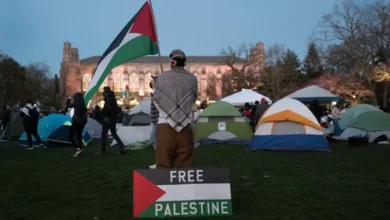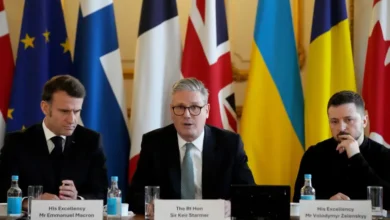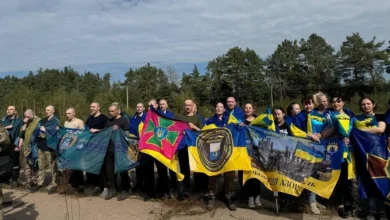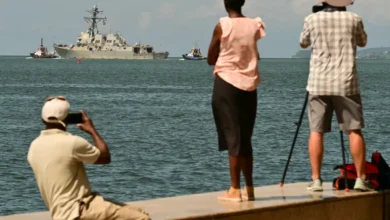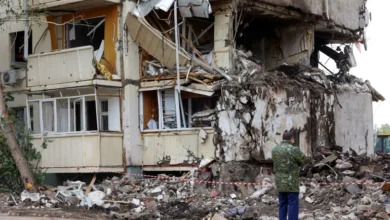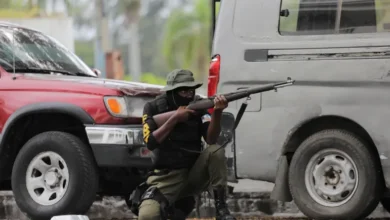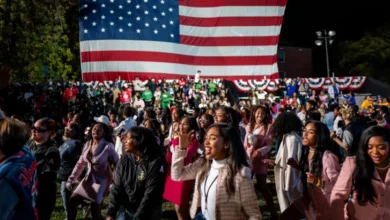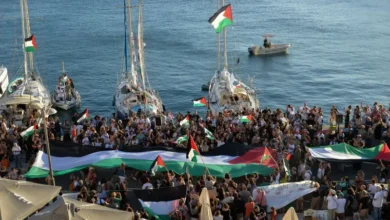As Israel pounds Gaza, BBC journalists accuse broadcaster of bias
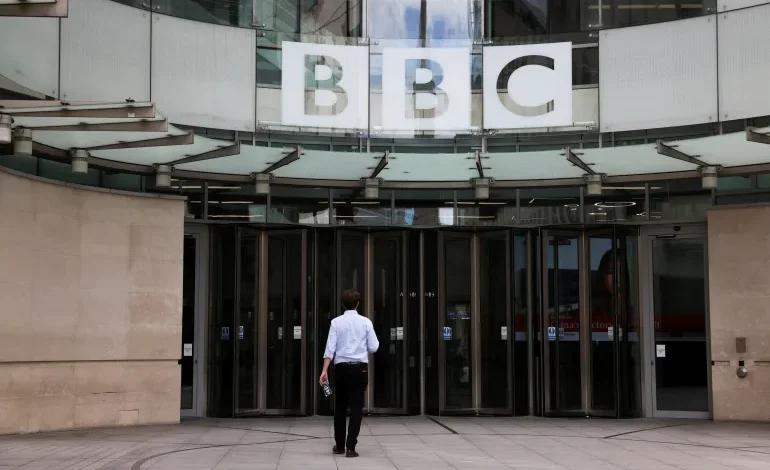
The BBC has been accused by its journalists of failing to tell the story of the Israel-Hamas conflict accurately, investing greater effort in humanising Israeli victims compared with Palestinians, and omitting key historical context in coverage.
In a 2,300-word letter written to Al Jazeera by eight UK-based journalists employed by the corporation, the BBC is also said to be guilty of a “double standard in how civilians are seen”, given that it is “unflinching” in its reporting of alleged Russian war crimes in Ukraine.
Fearing reprisal, the journalists requested anonymity. The group does not plan to send the letter to BBC executives, believing such a move was unlikely to lead to meaningful discussions.
They sent Al Jazeera the letter as a humanitarian disaster in Gaza escalates, and as grim milestones are reached at pace. At the time of writing, more than 14,500 Palestinians have been reported as killed by Israeli bombardment, including at least 6,000 children.
“The BBC has failed to accurately tell this story – through omission and lack of critical engagement with Israel’s claims – and it has therefore failed to help the public engage with and understand the human rights abuses unfolding in Gaza,” the letter reads. “Thousands of Palestinians have been killed since October 7. When will the number be high enough for our editorial stance to change?”
Israel declared war against Hamas after the Palestinian group, which governs the densely populated enclave, attacked southern Israel on October 7, killing about 1,200 Israelis and taking more than 200 hostage.
Rights groups and hundreds of thousands of protesters worldwide, outraged by the soaring Palestinian death toll in Gaza, have called for a ceasefire.
The war has also divided newsrooms globally, with disagreements over how each side is being portrayed, the level of empathy shown to Israeli and Palestinian victims, and the use of language.
The BBC journalists said that across British Broadcasting Corporation (BBC) platforms, terms like “massacre” and “atrocity”, have been reserved “only for Hamas, framing the group as the only instigator and perpetrator of violence in the region. This is inaccurate but aligns with the BBC’s overall coverage”.
The Hamas assault, while “appalling and devastating … does not justify the indiscriminate killing of thousands of Palestinian civilians, and the BBC cannot be seen to support – or fail to interrogate – the logic that it does,” their letter reads.
The journalists acknowledged “some strong isolated examples”, but said sensitively told stories about Palestinians were not “consistent”, particularly after the outbreak of war.
“It is largely in the last few weeks – as civilian deaths have exponentially increased and Western countries’ appetite for Israel’s attacks has waned – that the BBC has made more effort to humanise Palestinian civilians. For many, this feels too little too late, and shows that the positions taken by governments in the UK and US have undue influence on coverage.”
Al Jazeera interviewed two of the eight co-writers. Some of those behind the letter are people of colour.
“This organisation doesn’t represent us,” one of the co-writers told Al Jazeera.
“For me, and definitely for other people of colour, we can see blatantly that certain civilian lives are considered more worthy than others – that there is some sort of hierarchy at play. That is deeply, deeply hurtful because actually, none of us struggle to empathise with Palestinian civilians.
The journalist said that to them, it appears some staff members and senior reporters “don’t empathise as much with [Palestinians], as they do, for example, with Ukrainian civilians”.
Further critiquing the BBC’s storytelling, the journalists argue that while Palestinians have been asked whether they “condemn Hamas”, the same cannot be said for guests who defend Israel’s actions.
“[They] are not equally asked to ‘condemn’ the actions of the Israeli government, however high the civilian death toll in Gaza.”
On October 9, the BBC was criticised as lacking compassion over its interview with Husam Zomlot, the head of the Palestinian Mission to the United Kingdom, who lost several members of his family during the early days of Israel’s bombing campaign.
Zomlot, who does not represent Hamas, told presenter Kirsty Wark of his emotional pain. He listed the relatives who had been killed, describing them as “sitting ducks for the Israeli war machine”.
Wark replied: “I am sorry for your own personal loss. I mean, can I just be clear though, you cannot condone the killing of civilians in Israel, can you? Nor the killing of families?”
Zomlot, taken aback, replied: “No we don’t condone, no we don’t.”
The letter also claims that the BBC is failing to provide audiences with important background about Israel’s occupation and the history of Palestinian suffering.
“For Israel’s bombardment to be considered ‘self-defence’, events must begin with the Hamas-led attack,” they said. “News updates and articles neglect to include a line or two of critical historical context – on 75 years of occupation, the Nakba, or the asymmetric death toll across decades.”
The Nakba, or catastrophe, refers to the displacement and dispossession of Palestinians between 1947 and 1949, when Zionist paramilitaries and then Israel’s newly formed army destroyed more than 500 Palestinian villages and towns. About 15,000 Palestinians were killed, and more than 750,000 were forcibly displaced from their land.
Today’s crisis evokes memories of the Nakba for Palestinians in Gaza, many of whom are descendants of those who were uprooted decades ago.
“The BBC has often called the ongoing conflict ‘complex’. It is no more complex than any other conflict,” the letter reads. “It is our job to cut through rhetoric and misinformation; to explain what is happening and what has led to this.”
A BBC spokesperson denied the allegations.
In an email sent to Al Jazeera, the spokesperson said: “Throughout our reporting on the conflict the BBC has made clear the devastating human cost to civilians living in Gaza and Israel.”
They added that the BBC is “one of the only news organisations” to have journalists inside Gaza, who have been able to provide “on the ground reporting”.
“This has included many stories of Palestinian victims and first-hand testimony from civilians, doctors and aid-workers in Gaza, as well as a Panorama documentary, featuring human stories from both sides,” they said.
“When interviewing either the Israeli government, Hamas, Palestinian representatives, or other leaders, we are robust, challenging and aim to hold power to account.”
The spokesperson also sent a list of examples of BBC coverage on the war, which included human stories of Palestinian suffering.
One linked to a documentary on October 23, with the summary: “Panorama reports on the conflict between Israel and Hamas. After 1,400 Israelis, including women and children were murdered by Hamas fighters, Israel promised brutal retaliation to destroy Hamas. More than three thousand Palestinians, many women and children, have already been killed in Gaza. Reporter Jane Corbin hears the human stories on both sides and asks what does the escalating crisis mean for the wider region?”
Israel has since revised down the death toll from 1,400 to 1,200.
The summary is an example of the kind of language in Western media outlets that many have criticised; Israelis are described as being “murdered by Hamas fighters”, but Palestinians are “killed” by a nameless actor.
